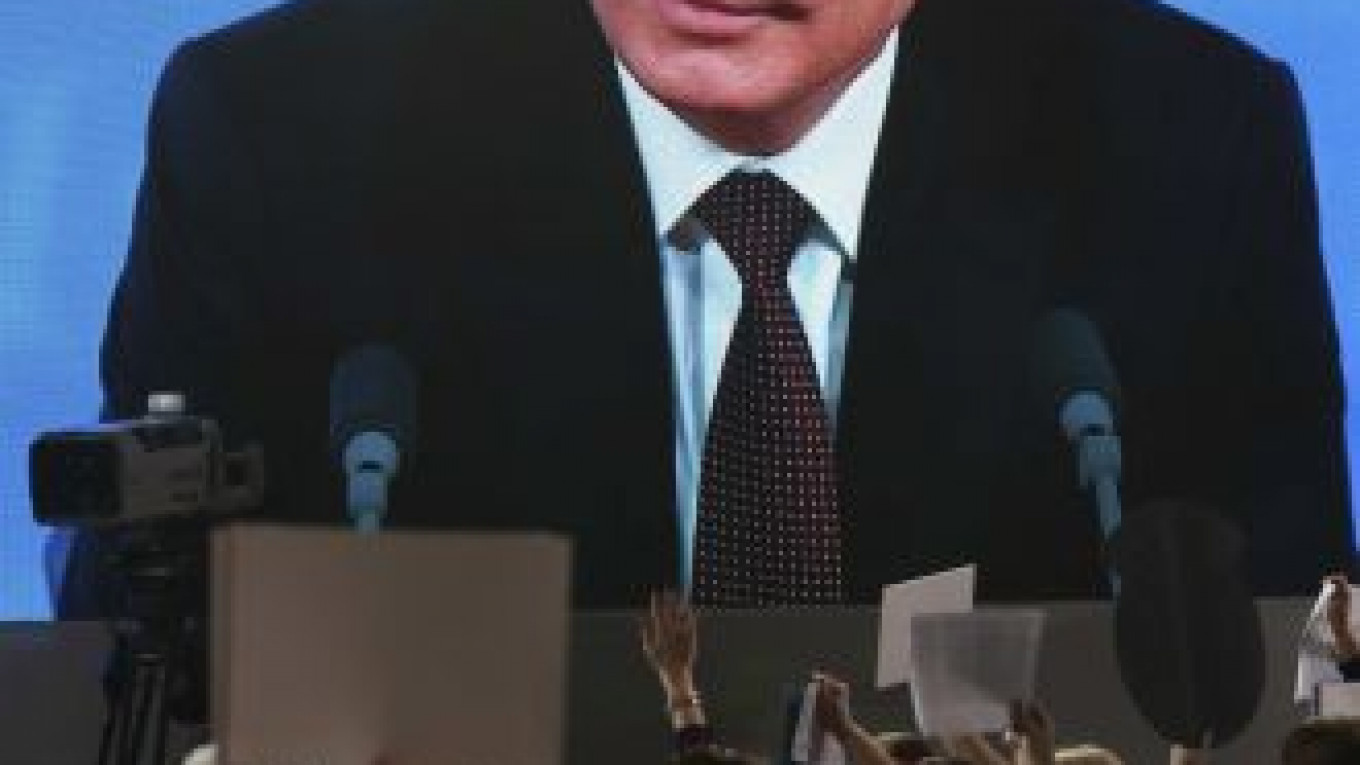President Vladimir Putin showed off his deft communication skills at his annual news conference on Thursday, demonstrating that he is comfortable answering almost any question imaginable, from those about economic woes and his political nemeses to those about troubled factories and religious values.
The 4 1/2-hour performance was largely overshadowed by Putin's announcement to a LifeNews journalist immediately afterward that he would soon pardon the country's most famous prisoner, former billionaire oil tycoon Mikhail Khodorkovsky. But with the performance, Putin seemed to be indicating that he has little to fear in the way of political competition from Khodorkovsky, once considered a potentially serious rival to Putin for the presidency.
The president justifies a $15 billion bailout of Ukraine as help for a “brotherly nation” and evades a question about a possible successor.
Despite an apparent cold and regular coughing, Putin answered almost 50 questions from the crowd of 1,327 journalists at the news conference, touching upon many of the most hotly debated issues in Russia today, including Russia's recent bailout of Ukraine, Putin's potential successor in the Kremlin, and the sputtering Russian economy.
The questions reflected the mix of journalists in the crowd, who came from sharply oppositional media as well as state-owned, Kremlin-friendly outlets, with some trying to exhibit their loyalty to the president and others posturing with critical stances.
One of the first questions of the news conference was a softball from a journalist at state-run Channel One television.
"Why is Russia accused of flexing its muscles when there are 200 nuclear weapons in Europe that are not controlled by the Europeans?" the journalist asked, apparently referring to U.S. weapons.
"We are having a good day today," Putin answered with approval. "You said it all — I don't even know what to add."
In contrast, Los Angeles Times correspondent Sergei Loiko attempted to challenge Putin, asking whether Russia would, as has been speculated, ever consider sending troops into Ukraine if the current regime in Kiev needed military support.
"I want to get a precise answer," Loiko said, his voice trembling. "And on what conditions?"
Putin appeared unfazed by the question. "This is complete nonsense — none of this is happening and it never will," he said.
Ukraine was by far the most popular topic for questions, with Putin reiterating that Ukraine is "a brotherly nation" that requires Russia's assistance.
Putin also promised favors to various journalists who came from some of Russia's far-flung regions to speak out about their local difficulties, such as the closing of factories and a lack of coal for heating in the winter.
He listened patiently to sharp criticism from those whom he called "representatives of the liberal political camp," who criticized him about the Bolotnaya, Pussy Riot and Greenpeace court cases.
Most of all, Putin slowly and dispassionately explained his position to the hundreds of journalists assembled at Moscow's World Trade Center.
Demonstrating his theatrical skills, Putin was sweet to those who wanted him to be caring, acerbic to those who confronted him, and strongly self-confident throughout.
He tried to speak Ukrainian to a journalist from Ukraine and said a few words in Estonian to a representative of Tallinn-based Paldiski radio.
Putin evaded a question about his potential successor, simply saying that the leaders of all four political parties represented in the State Duma were strong leaders. The list included Prime Minister Dmitry Medvedev, who leads the ruling United Russia, but Putin devoted no special words to the former president.
When the journalist who asked the question, Alexander Gamov of Komsomolskaya Pravda, followed up, pushing Putin for an answer, the president responded: "There is nothing to say right now."
Some reporters apparently viewed the event as life-altering, with Elena Milchanovska from the newspaper Sobesednik declaring that her personal life had improved after meeting Putin on an earlier occasion.
"I love you in a platonic way," she confessed, prompting applause from the crowd of other journalists.
Many reporters who made the trip to Moscow from numerous Russian regions thanked Putin for his personal role in fulfilling certain projects back home.
"Without your help we would not have seen the new road that bypasses Ryazan," said Natalia Smolyaninova, a reporter from the Ryazan region southwest of Moscow.
Putin took only one question from a Western-born journalist, CNN's Jill Dougherty, who asked about Putin's emphasis on religion and conservative values. But a Russian journalist from a Western outlet probed Putin about Russia's image abroad.
Bloomberg reporter Ilya Arkhipov asked how Russia's efforts to change its image abroad could be successful when actions are taken such as appointing arch-conservative Dmitry Kiselyov the head of a newly created news agency.
"State media have to be headed by patriotic people who defend the interests of Russia," Putin retorted.
The response was followed by a round of applause, after which the president wished everyone a Happy New Year and departed from the stage.
Contact the author at i.nechepurenko@imedia.ru
A Message from The Moscow Times:
Dear readers,
We are facing unprecedented challenges. Russia's Prosecutor General's Office has designated The Moscow Times as an "undesirable" organization, criminalizing our work and putting our staff at risk of prosecution. This follows our earlier unjust labeling as a "foreign agent."
These actions are direct attempts to silence independent journalism in Russia. The authorities claim our work "discredits the decisions of the Russian leadership." We see things differently: we strive to provide accurate, unbiased reporting on Russia.
We, the journalists of The Moscow Times, refuse to be silenced. But to continue our work, we need your help.
Your support, no matter how small, makes a world of difference. If you can, please support us monthly starting from just $2. It's quick to set up, and every contribution makes a significant impact.
By supporting The Moscow Times, you're defending open, independent journalism in the face of repression. Thank you for standing with us.
Remind me later.






